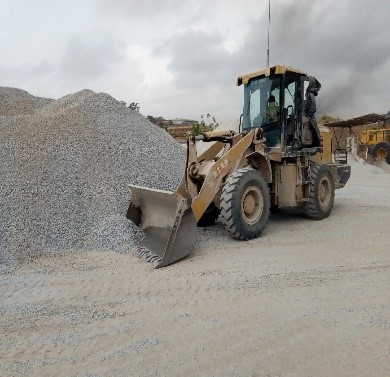
Audio By Carbonatix
Scientists at the CSIR-Building and Road Research Institute (CSIR-BRRI), Kumasi and the KNUST School of Public Health and the University of Washington, Seatle, are calling for upward readjustment of Ghana EPA permissible noise level for heavy industrial areas.
The recommendation comes at the back of research which found the ambient noise permissible limit at 70 dBA to be unrealistic.
A-weighted decibels, or “dBA,” are often used when describing sound level recommendations for healthy listening. While the dB scale is based only on sound intensity, the dBA scale is based on intensity and on how the human ear responds.
The cross sectional study, conducted in the Ashanti and Ahafo regions, was aimed at establishing the occupational noise exposure levels of carpenters and operators of concrete mixers, bulldozers, excavators, among others.
The noise measuring tool known as dosimeter was mounted on a worker’s clothing at the shoulder level to monitor the noise exposure level for each specific task executed.
They found the bulldozer produced the highest average daily noise exposure level and small steel rollers produced the least. All the nine worker groups monitored with the noise dosimeter were exposed to mean noise levels exceeding the Ghana EPA permissible limits by between 10.1dBA and 23.6dBA.
The operators of bulldozer, asphalt-producing plant, concrete mixer, pneumatic tyre roller, carpenters, pay-loader, excavator, steel roller and small steel roller were exposed to average daily personal noise exposure levels of 93.6dBA, 92.4dBA, 87.9dBA, 87.3dBA, 86.4dBA, 86.2dBA, 85.6dBA, 81.5dBA and 80.1dBA respectively.
The peak noise pressure levels from all the equipment exceeded the limits of Ghana EPA (by 50.7dBA–72.6dBA), ISO/NIOSH (by 35.7dBA–57.6 dBA) and OSHA (by 30.7dBA– 52.6dBA). The highest was recorded from the bulldozer, followed in that order by the carpenters, excavator, pneumatic tyre roller, asphalt-producing plant, pay-loader, concrete mixer, small steel roller and steel roller.
“It’s obvious from the study that the Ghana EPA permissible limits for heavy industrial areas, where road construction falls set at 70dBA during night and day is unrealistic,” said the lead researcher at the CSIR-BRRI and Occupational Hygienist, Isaac Kofi Yankson.
The scientists which included researchers from the Komfo Ankoye Teaching Hospital, University of Washington, Seattle and Ghana Health Service, however say, the recommended noise level does not pre-dispose unprotected workers to noise-induced hearing loss over an 8-hour working period.
Mr. Yankson advises owners of construction companies to provide welfare facilities such as pre-employment and in-service medical monitoring.
Latest Stories
-
Livestream: Newsfile discusses KIA renaming, NPP unity test and inflation credibility
11 minutes -
Zambia scraps taxes on Fugu from Ghana for personal use following social media drama
1 hour -
Gunfire silences prosperity as PLO Lumumba warns of ‘bleeding’ African continent
3 hours -
African Leaders must shift from speeches to action – P.L.O Lumumba
3 hours -
Ace Ankomah demands radical overhaul of Ghana’s science and innovation sector
3 hours -
Trump signs executive order threatening tariffs for countries trading with Iran
3 hours -
From Hollywood to the homeland: Why African countries are courting black American stars
4 hours -
Ambulance service slams ‘taxi transfer’ of newborn as viral negligence claims debunked
4 hours -
High stakes in Ayawaso East as NDC delegates head to the polls today
5 hours -
Youth unemployment is the biggest threat to Africa – Gabby
5 hours -
Minority demands urgent Finance Minister summons as ‘Agbogbloshie’ prices ignite parliamentary clash
6 hours -
Baba Jamal’s highest will be 38% in Ayawaso East NDC primary – Mussa Dankwah
6 hours -
Stranded beans and staggering debts: Ghana’s cocoa sector faces systemic crisis
7 hours -
Chief Justice sets up special courts for corruption and galamsey
7 hours -
Airport renaming and inflation trends to take centre stage on Joy Prime’s Prime Insight this Saturday
8 hours

